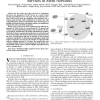Free Online Productivity Tools
i2Speak
i2Symbol
i2OCR
iTex2Img
iWeb2Print
iWeb2Shot
i2Type
iPdf2Split
iPdf2Merge
i2Bopomofo
i2Arabic
i2Style
i2Image
i2PDF
iLatex2Rtf
Sci2ools
136
click to vote
JSAC
2006
2006
Performance Optimizations for Deploying VoIP Services in Mesh Networks
In the recent past, there has been a tremendous increase in the popularity of VoIP services as a result of huge growth in broadband access. The same voice-over-Internet protocol (VoIP) service poses new challenges when deployed over a wireless mesh network, while enabling users to make voice calls using WiFi phones. Packet losses and delay due to interference in a multiple-hop mesh network with limited capacity can significantly degrade the end-to-end VoIP call quality. In this work, we discuss the basic requirements for efficient deployment of VoIP services over a mesh network. We present and evaluate practical optimizing techniques that can enhance the network capacity, maintain the VoIP quality and handle user mobility efficiently. Extensive experiments conducted on a real testbed and ns-2 provide insights into the performance issues and demonstrate the level of improvement that can be obtained by the proposed techniques. Specifically, we find that packet aggregation along with head...
JSAC 2006 | Mesh Network | VoIP | VoIP Services |
Related Content
| Added | 13 Dec 2010 |
| Updated | 13 Dec 2010 |
| Type | Journal |
| Year | 2006 |
| Where | JSAC |
| Authors | Samrat Ganguly, Vishnu Navda, Kyungtae Kim, Anand Kashyap, Dragor Niculescu, Rauf Izmailov, Sangjin Hong, Samir R. Das |
Comments (0)

